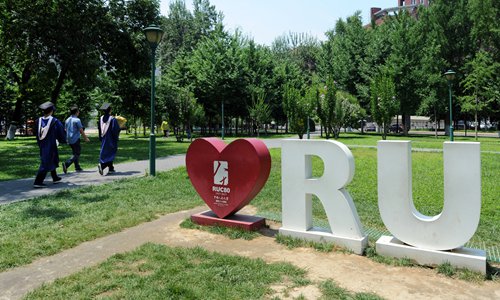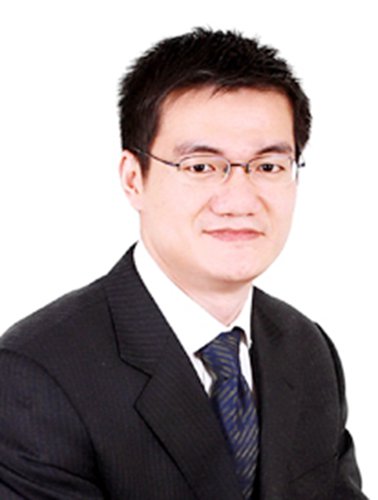HOME >> CHINA
Youngest professor aims to bring Chinese antitrust laws to global level
Source:Global Times Published: 2019/7/4 20:28:40

Renmin University of China Photo: IC
Ye Guangliang may turn on his computer at any time of the day, no matter how late at night or early in the morning.
He is 12 hours earlier than his tutor in the US, but when it comes to research, no time is too inconvenient to connect.
Ye takes very little rest and often goes home at midnight.
He is the first professor in Beijing's Renmin University of China born after 1980, and is also the director at the university's Antitrust and Competition Policy Center.
On June 20, Ye became vice principal of the University of Hainan in South China, the Xinhua News Agency reported.
War without guns
What drives Ye's research is a war that is fought without guns.
"My current work is policy research into antitrust and competition," he told the Guangming Daily. "In economic operations, the more powerful companies in a market or a government that owns rights could restrict competition in the market, leading to a distortion in the distribution of market resources or restrain creativity," he said. "Under such situations, we need the Anti-Monopoly war to keep order."
"My research is to analyze if a company's operations restrict market competition and provide a theoretical basis for the legal enforcement of the Anti-Monopoly Law."
This dream of his was formed when he was studying in the US. "From the moment I left China, I felt my connection with my country could not be cut. An individual's value is shown in the contribution he makes to the country's development and people's happiness," he noted.
To better answer questions that exist in the real world, he chose economics as his major and received postgraduate and PhD degrees in three years.
After completing his study abroad, he returned to China. After another six years, he became the youngest professor at China's Renmin University of China.
During his study abroad, Ye chose "mixed oligopoly" as the focus of his research. Although there weren't many researchers studying this topic in the US, mixed oligopoly competition was a fairly common situation in China. Ye believed it was a worthy direction to follow.
After deciding on the topic, Ye spent one year reading through all the articles related to his research direction and began to take related courses. He also decided to write his paper while taking these courses.
Usually, it takes five years to complete the study and gain a PhD degree, but Ye managed to do it in three after graduating from a domestic university.

Profile picture of Ye Guangliang at the official website of Renmin University of China Photo: official website of Renmin University of China
Yearning to return
Ye did not come back to China during those three years.
The city where he studied was covered with snow for five months a year. When he came out of the classroom, the temperature outside was normally minus 20 C.
The extreme weather did not make life particularly difficult for Ye, but in his heart, he wanted to go back to China as early as possible.
When Ye went abroad, he found that some foreigners' understanding of China was still stuck in the 1950s and 1960s. Some even asked him whether the country had cars. Ye believed that he had the responsibility to tell foreigners about the real China.
Ye was very impressed by the fact that Lenovo had bought IBM's PC business in 2004. It showed the strength of Chinese companies and also changed the impression of those who thought that China was still a completely agricultural country.
In 2006, Ye made the decision to return to China after graduation, in the hope of making a contribution to the study of economics in his own country.
Ye devoted himself to education, becoming a teacher after his return. His students remembered Ye as always being very detailed in tutoring them with their dissertations.
Ye preferred to publish articles together with students rather than on his own. He was filled with a sense of accomplishment when his students made achievements.
Ye devoted himself to the reform of postgraduate teaching when he was back at the university in China. At that time, domestic postgraduate training in economics was dominated by the description of traditional economic principles, with few applications of mathematical models and quantitative empirical research.
Facing this situation, Ye and the four doctoral students who returned to China with him started to apply the research paradigm used in Europe and America to strengthen the basic training of postgraduates and promoted the internationalization of economics education in China.
Ye also constructed a "hybrid oligarch model" to study the transition economy, making analysis more quantitative and accurate.
Raising the level
Working in a university does not necessarily mean shutting yourself inside an ivory tower. Ye prefers to apply his knowledge to find solutions to problems.
At the end of 2013, he launched an anti-monopoly and policy for fair competition research institute to create an anti-monopoly research platform for China.
Under Ye's leadership, the institute has been proactively involved in the front line of Anti-Monopoly Law enforcement.
Ye feels very proud to see China's anti-monopoly law enforcement level gradually aligning with that of the international community.
"Anything that has to do with the motherland is your business. [It's meaningful] to do something practical rather than just talking about patriotism," Ye was quoted as saying by the news platform of Renmin University of China, when he was asked to define patriotism in a simplified way.
Ye has three main goals for the future. First, he wants to establish a set of long-term mechanisms in the Xinjiang Production and Construction Corps, so that professionals will be able to offer their services on this platform.
Next, he aims to train his students and hone more talents in the field of anti-monopoly and policy for fair competition; and third, he wants to deepen research into antitrust and competition policy.
In the past few years, the fair competition review system for regulating administrative monopoly has continually improved. Also, anti-monopoly law enforcement agencies have continued to integrate.
The next objective is to make the competition policy more supportive for innovation and improvement of quality, said Ye. More reasonable mechanisms will enable Chinese high-tech enterprises to gain a better position in the world market, creating institutional guarantees for China's leading role in chip sets, the auto industry and high-end manufacturing, he said.
Global Times
Newspaper headline: Breaking the monopoly
RELATED ARTICLES:
Posted in: PROFILE